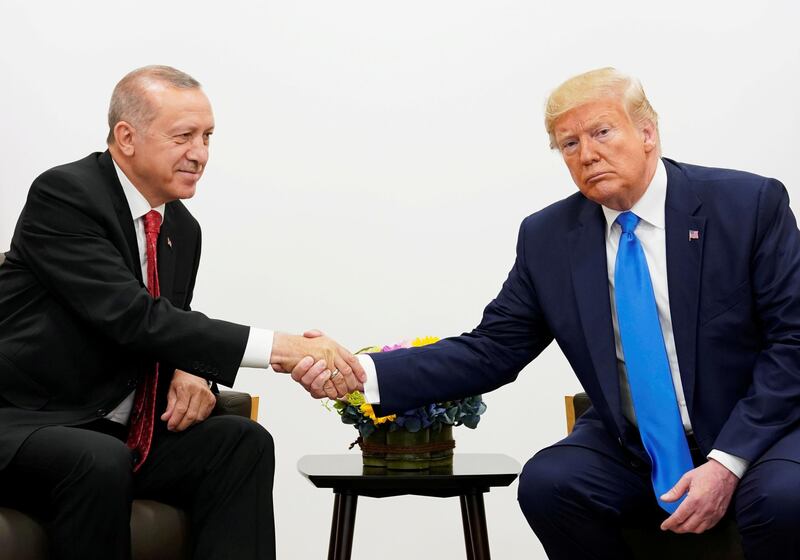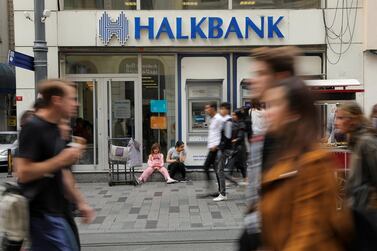Turkish President Recep Tayyip Erdogan will meet Donald Trump in the Oval Office on Wednesday, but it may be marred by protests, congressional uproar over the visit and two major lawsuits against Turkey in US courts.
Mr Erdogan's first visit since 2017 comes as Ankara faces mounting criticism over its incursion into Syria, now in its second month.
It has been the target of sanctions bills and condemnation after it bought a missile defence system from Russia.
The latest sanctions passed by the House of Representatives two weeks ago would block US arms sales to Ankara, and penalise Turkish financial institutions and senior military officials.
The Senate will wait until Mr Erdogan leaves before it votes on the bill.
But both chambers have passed legislation over Turkey’s purchase of the Russian S-400 ballistic missile system.
The US Defence Department has cancelled F-35 fighter jet deliveries to Ankara in July but the Trump administration has delayed further penalties required by Congress.
Meanwhile, an investigation by The New York Times published on Tuesday claims that sons-in-law of Mr Trump and Mr Erdogan have a close business relationship, along with another Turkish tycoon connected to the Trump organisation.
The relationship between Jared Kushner and Berat Albayrak, the newspaper claims, has helped to delay sanctions on Ankara for the missile purchase.
Legislators from both parties have also submitted a letter to US Secretary of State Mike Pompeo condemning the visit.
“Now is a particularly inappropriate time for President Erdogan to visit the United States, and we urge you to rescind this invitation,” the letter read.
It said Mr Erdogan’s Syrian operation had “disastrous consequences for US national security, has led to deep divisions in the Nato alliance and caused a humanitarian crisis".
Bipartisan group of members of Congress, led by @RepEliotEngel, to @realDonaldTrump ahead of @RTErdogan's visit: "Now is a particularly inappropriate time for President Erdogan to visit the United States, and we urge you to rescind this invitation: pic.twitter.com/jAPjNGGOGs
— Paul D. Shinkman (@PDShinkman) November 11, 2019
An October 17 agreement between the US and Turkey called for a ceasefire and withdrawal by the Kurdish People’s Protection Units (YPG) in five days from a 32-kilometre deep zone in north-east Syria.
That was in exchange for Turkish co-operation in fighting ISIS, guarding jails and protecting minorities.
But since then a full ceasefire has not happened, and US officials no longer acknowledge an agreement was reached. Instead, they call it a "statement".
Congresswoman Liz Cheney, wrote to Mr Pompeo urging assurances to protect those protesting against Mr Erdogan on Wednesday.
In 2017, Mr Erdogan’s security detail assaulted US citizens protesting against his visit.
Those assaults are now a subject of a continuing lawsuit in Washington against the Turkish authorities.
Secretary Pompeo should deny entry to the US for any of the individuals involved in the attacks on American protesters during President Erdogan’s last visit. He should expel any that are already here. America will not tolerate attacks on our citizens. https://t.co/iaWFgofNUz
— Rep. Liz Cheney (@RepLizCheney) November 11, 2019
Another lawsuit against major Turkish state lender Halkbank has also strained US-Turkish relations.
The suit accuses the bank of helping Iran to evade sanctions on billions of dollars that were frozen in foreign accounts.
Nicholas Danforth, a senior visiting fellow at the German Marshall Fund where he studies Turkey, does not expect a major breakthrough from the visit.
“Turkey faces sanctions over its purchase of Russian missiles, a looming Halkbank investigation in New York and ongoing anger over its Syria operation," Mr Danforth said.
"All of these will further strain US-Turkish relations. Mr Trump can't make them go away single-handedly.
“At best, both sides will manage to create the illusion of a breakthrough, and at worst they won't even be able to manage that.
“A lot of people are just asking whether Mr Erdogan’s guards are going to beat more people up.”
But Briol Baskan of the Middle East Institute said the two sides may need each other on Syria.
“Ankara’s policy towards Syria has evolved and aims to help build a Turkey-friendly Arab statelet in the territories now under its military control,” Mr Baskan argued.
“What Ankara should realise, however, is that such an undertaking will require more than just persuading President Trump, who has his own battles to fight at home."
Despite differences in foreign policy, the Trump administration is hoping to boost trade with Turkey to $100 billion (Dh367.3bn) a year from $20.5bn in 2018.
US Commerce Secretary Wilbur Ross visited Ankara in September but with more congressional sanctions looming and a continued crisis in Syria, this goal appears to be hindered for now.







